|

songs | interviews | photos | tours | boots | press releases | timeline
Bust (US)
February/March 2005
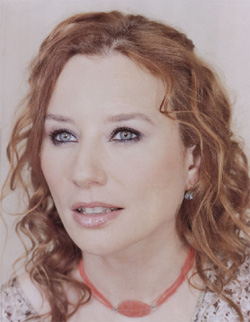
"famous amos"
Interview by Tracie Egan
Photo by Michael Lavine
As Tori Amos gears up for a media onslaught with the release of a new book and new album, she lets us in on what's so amazing about really deep thoughts on sex and feminism.
There are some experiences shared by young women that have become timeless traditions: puking in public for the first time, subsisting on a diet of Ramen noodles, and curling up on a college-issued mattress, listening to a Tori Amos album over and over until your college-issued roommate wants you dead. Although she's matured quite a bit since the release of her seminal album Little Earthquakes in 1992, remarkably, Amos continues to claim a loyal audience of women in their late teens and early 20s. With a musical style akin to that of '70s singer/songwriters like Carole King and Laura Nyro, Amos' song topics range from rape and religion to masturbation and miscarriage. So it makes sense that girls would relate to her repeated themes of sexuality, feminism, and overall womanhood. Still, while Amos' songs are often deeply personal, her lyrics are so immersed in metaphor that they're often indecipherable (e.g. "Rabbit, where'd you put the keys, girl?" from Under the Pink's "Cornflake Girl," a song that Tori says is about betrayal between women). But in February, fans will be able to read their favorite songstress like a book, with the publication of Tori Amos: Piece by Piece, an autobiography co-authored by revered music journalist Ann Powers, followed by the release of a new studio album, The Beekeeper.
Piece by Piece is an incredibly intimate look at Tori's life and music, revealing details about her childhood, her miscarriages, her creative process, her life as a wife and mother, and what the deal was with her hair-band look during her first project, Y Kant Tori Read. Born Myra Ellen Amos to a Methodist minister and a housewife in the Washington D.C. area in 1963, Tori won a scholarship for her piano playing to the Peabody Conservatory in Baltimore, MD, at age five, making her the youngest person to ever be accepted to the prestigious music school. The virtuoso, who says she was born a feminist, explains in Piece by Piece that she's heavily influenced by her religious upbringing, and even gives an account of masturbating to a portrait of Jesus when she was eight years old. Of course, there are also mentions of goddesses, feaeries, and Native American folklore, but Tori fans view her earthiness as an endearing quirk. And after reading about the sort of peace and happiness she's found in her life with her music, her husband, and her daughter Natashya, it makes you wonder if you should be burning some sage and reading up on mythology yourself. I got to talk with the girl behind the piano on the phone from her home in North Cornwall, England, and found her to be friendly, wise, and totally chatty. She's kinda like a goddess herself.
I know that you're in a lot of historical and mythological aspects of feminism. Little Earthquakes was released in the U.S. in '92, when Riot Grrrl was emerging. Have you ever felt aligned with that movement or other contemporary forms of feminism?
Well, I feel aligned with any woman who is expressing herself, even though we do it differently. That's the beauty of it. There are so many female archetypes in mythology, and one doesn't replace the other. That's what Ann and I were trying to get in Piece by Piece. Aphrodite can never be Pele-they hold different places in the pantheon. We all offer something different to the table and when that isn't valued, it all breaks down. And of course, the patriarchy, as a system, doesn't value the differences and uniqueness in people. True feminism, if we really want to make a difference, should be about encouraging people to express themselves. If they're not being encouraged to do this, then somebody's trying to control them. And that might be somebody who calls him or herself a feminist.
Anything historically linked with femininity is often viewed as inferior. In your writing/art/music, you seem to focus on the reclamation of the feminine, whereas a lot of feminists, I feel, are actually femiphobic.
That's no different than those who are running the patriarchy who think certain aspects of femininity are worthy and some aren't. It's the same thinking. It's been a fascination that I have-how some [feminists] are very similar in their tactics to the right wing, how they attack and control. That isn't, to me, transcendent feminism. That's just angry women. They are rejecting pieces of the feminine because they don't need to claim them for themselves. There's certain music that I don't play, but it doesn't mean that I need to diss it. I really find that when you're inclusive, then you've really done your work on yourself.
I'm sure that same arm of feminism would find it ironic that a feminist like yourself could find ultimate happiness and peace as a wife and mother.
[Sarcastically] I'm laughing. You know, it takes a lot of work and energy to take on somebody else's needs and feelings. If we're going to be lighthouses for the next generation, women should be able to feel like they're not betraying feminism if they're good moms. That's why a lot of women have exited stage left. They feel like the "movement" became too much like the patriarchy-controlling them, dissing them in a way. You get enough of that from the boss, man. You get enough of that from the Bible.
When I lived alone and didn't have to answer to anybody, I had a really different life. I'm not saying I didn't enjoy that life. I did. But [marriage and motherhood] is a different experience. Having a child means that it can't be about you all the time. But finding a balance is key-not losing your self-respect [by being] trampled on as a mother or a wife, and retaining your personhood within [those roles]. Look at Mother Nature. The seas can be calm and yet she can become a tidal wave. That's been my greatest teacher-the earth herself. Watching how she can hold the extremes in both hands and bring them into balance. Now, some women relate more to [other] aspects. You need the nurturers, [but you also] need the warriors. You need the ones who can say, "I can give an assessment about this without being swayed by my emotions in this moment." Like my sister, she's an internist. Sometimes she has to make pretty serious decisions and she has to keep her emotions out of it. You need all different kinds of women to make the matriarchy.
The same can be said for the different-sometimes-clashinging-roles within one woman. In the "Mary Magdalene" chapter of Piece by Piece, you discuss trying to resolve the sacred and the profane, the spirituality and sex in your life.
There has to be a marriage within every woman between the physical and the spiritual, and the emotional and mental. There has to be integration at some point in your life or else there's this constant division. I think that the most sensual thing is when a woman accepts who she is. Women and sexuality have been thought of as something that has to be talked about behind closed doors. Obviously, taking your sexuality to a three-year-old's birthday party is just very misguided. But the idea that you can't be a mother and be involved in a a very passionate relationship isn't true. Yet, for so long, women were divided. The Mother Mary or the Magdalene-if we're talking about Christian mythology-you were either one or the other. Until I married the two Marys within my being, I was really divided. I'm not one of those people who's gonna dance naked on a tabletop. But being in touch with your sexuality is different from woman to woman.
Speaking of table dancing, a lot of female pop stars are more sexualized than ever. They're putting on this elaborate display, but it makes you wonder if that's bringing them any closer to sexual satisfaction.
Well, I don't know. I think what you have to ask yourself is: are you allowing yourself to be made an object, or are you the subject? Only you can know this. I've known women [musicians] who have been exposed to projections from the masses about their sexuality, and they start drowning in it. You know, the idea that people are masturbating to their picture. It's like, "You wanted them to do this!" And [they say], "No, I didn't." Be honest with yourself. Yeah, you did. I'll tell you right now, I don't give a flying fuck if people masturbate to my picture. You know why? Because it's none of my business. Now, if I have inspired people to think about what their relationship is with themselves then that, as a songwriter, is what I have wanted to do.
How are you going to approach discussing this sort of stuff with your daughter?
She's only four. There are certain things that we don't talk about now because it's not in her realm. But we talk about [other] things already. She knows there are some guys who are looking for a prince and some women looking for a princess. She knows that one of her uncles is looking for a prince and she talks to him about it all the time. And I think that's pretty good that we're there at four. Sometimes [kids] don't even know what they're watching. They think that you make babies by kissing. They can seem so grown up in some ways, but we have to be the grownups here.
I was hungry when I was a teenager to try and find that balance [of sexuality]. Because of how I was brought up, I could not be respectable, spiritual, and a good mother if I had the desires I had-and still have! My desires are being met. I married a hottie. [Laughs] I think that we can be very hard on ourselves as women. It's a shame.
But on the upswing, there's a lot more open discussion about masturbation and sexual satisfaction for women than there used to be.
But what there isn't is a balance of spirituality and deep love, and an essence of the divine within sexuality. So many women have allowed themselves to become objectified. That isn't sacred. And we go back to the sacred prostitute idea. This is holy. I don't mean just 'cause we have an extra hole!
original article
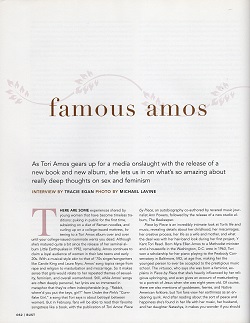 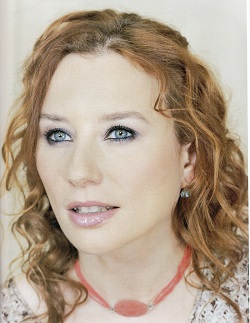
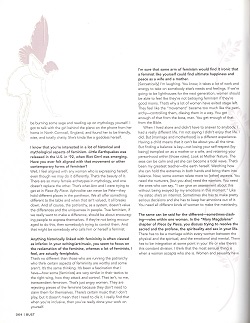 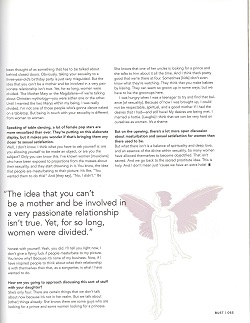
[scans by Sakre Heinze]
t o r i p h o r i a
tori amos digital archive
yessaid.com
|